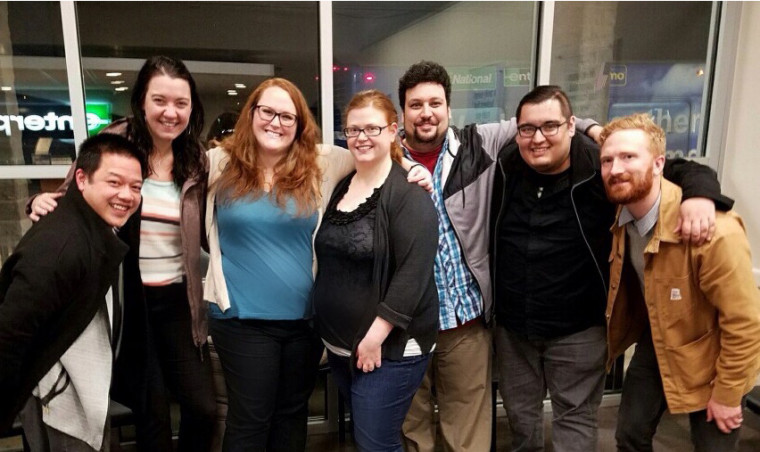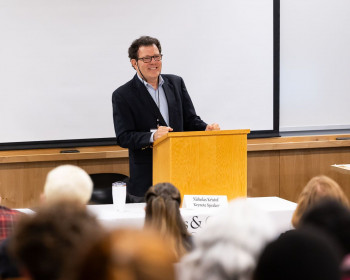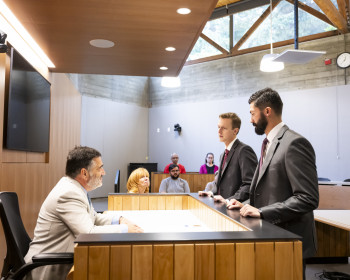Pro Bono at the Border
Open gallery

Many consider the holiday season to be a time for giving and giving back. Over winter break, seven law students from the Immigration Student Group (ISG) took that spirit to heart and spent a week volunteering at the South Texas Family Residential Center in Dilley, Texas through the CARA Family Detention Pro Bono Project. Professor Juliet Stumpf, who teaches immigration law, says Lewis & Clark law students have been volunteering with CARA for nearly two years, estimating that there have been up to a dozen trips to Dilley so far.
The South Texas Family Residential Center is operated by the private prison company, Corrections Corporation of America, and holds up to 2,400 women and children who have crossed the Mexican border into the United States. CARA’s pro bono project provides legal support for those who are seeking asylum in the United States. Most, if not all, of the women CARA serves are from the Northern Triangle of Central America (El Salvador, Guatemala, and Honduras) and have been victims of gang violence, domestic violence, and sexual abuse.
The law students, Tessa Copeland, Amy Adams, Chris Chapin, Kate Edwards, Will Stevens, Maria Valdez, and Favio Perez, volunteered from December 18-24 from about 8:00 am to 8:00 pm each day. Their main tasks were to prepare the women for Credible Fear Interviews and bond hearings with the asylum officers, and to help them understand the complex immigration process. “Credible Fear Interviews are how the US government determines whether someone has a ‘real’ reason to seek asylum here,” said Adams.
“The bulk of what we do is speak to the women individually about the reasons they fled their home countries in order to prepare them for their interviews in front of an asylum officer. This involves us having to speak with them in detail about traumatic events,” said Copeland.
According to Adams, the Immigration and Customs Enforcement (ICE) agency had wrongfully informed many women of when they would be released. “I spoke to nearly 200 women who had been given a release date that had come and gone, and they and their children were still detained.”
A particularly impactful moment from that week was the release of a woman and her two young daughters, about three to five years old. The woman was seeking medical help for one of her daughters who had been sick with diarrhea and vomiting for four to five days. The detention center’s medical staff refused to provide medical assistance, so the ISG students went into action, taking an affidavit from the mother and giving it to the CARA attorneys who used it to advocate for their release. ICE gave the family misinformation about their release date and the volunteers had to intervene again. Finally, on Christmas Eve, the family was released and reunited with relatives in the United States. “It was the best Christmas gift ever,” said Perez.
Before leaving, one of the daughters handed Perez a sticker to thank him. Perez keeps that sticker on his laptop as a reminder that there are women and children who are being wrongfully detained and are still in need of help. He plans to return to Dilley over spring break.
Adams says the trip was an eye-opener. “This experience made me feel that US immigration policy is not as humane as I thought,” she said. “I didn’t realize how hostile ICE is to refugees. It also made me more interested in pursuing a career in immigration law!”
“It’s been one of the most valuable experiences I’ve had in law school,” says Copeland, a third-year law student who has participated in the program three times. She and another Lewis & Clark law student, Cecilia Anguiano, who volunteered in Dilley on a prior trip, are presenting at a family detention symposium at the University of District Columbia’s law school in early February.
While most of the students plan to pursue immigration law upon graduation, Copeland feels that the experience is great for anyone, even those who don’t plan to practice immigration law.
For more details about Lewis & Clark’s involvement with the CARA program, contact Professors Juliet Stumpf or Stephen Manning. To assist students with their next trip to Dilley over Spring Break, donate through the ISG’s GoFundMe page.
Law Communications is located in room 304 of Legal Research Center (LRC) on the law Campus.
MSC: 51
email jasbury@lclark.edu
voice 503-768-6605
Cell: 626-676-7923
Assistant Dean,
Communications and External Relations, Law School
Judy Asbury
Law Communications
Lewis & Clark Law School
10101 S. Terwilliger Boulevard MSC 51
Portland OR 97219

